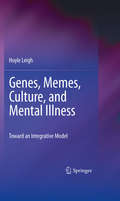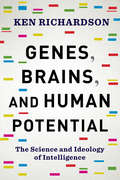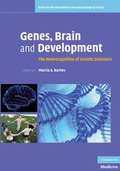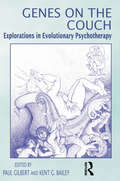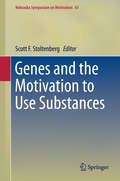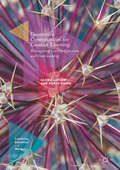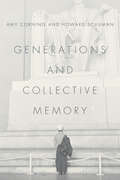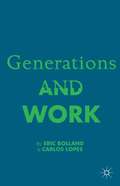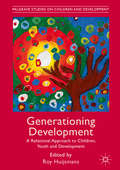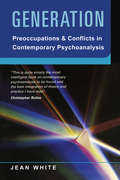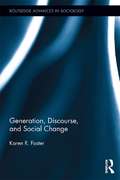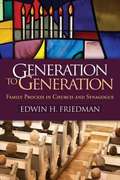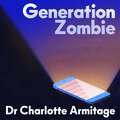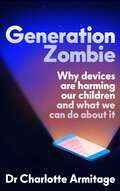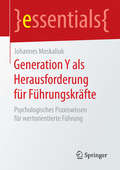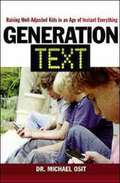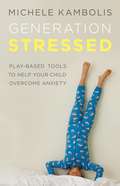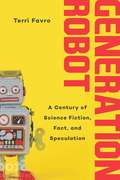- Table View
- List View
Genes, Memes, Culture, and Mental Illness
by Hoyle LeighWhat produces mental illness: genes, environment, both,neither? The answer can be found in memes--replicable units of information linking genes and environment in the memory and in culture--whose effects on individual brain development can be benign or toxic. This book reconceptualizes mental disorders as products of stressful gene-meme interactions and introduces a biopsychosocial template for meme-based diagnosis and treatment. A range of therapeutic modalities, both broad-spectrum (meditation) and specific(cognitive-behavioral), for countering negative memes and their replication are considered, as are possibilities for memetic prevention strategies. In this book, the author outlines the roles of genes and memes in the evolution of the human brain; elucidates the creation, storage, and evolution of memes within individual brains; examines culture as a carrier and supplier of memes to the individual; provides examples of gene-meme interactions that can result in anxiety, depression, and other disorders; proposes a multiaxial gene-meme model for diagnosing mental illness; identifies areas of meme-based prevention for at-risk children; and defines specific syndromes in terms of memetic symptoms, genetic/ memetic development, and meme-based treatment.
Genes, Brains, and Human Potential: The Science and Ideology of Intelligence
by Ken RichardsonFor countless generations people have been told that their potential as humans is limited and fundamentally unequal. The social order, they have been assured, is arranged by powers beyond their control. More recently the appeal has been to biology, specifically the genes, brain sciences, the concept of intelligence, and powerful new technologies. Reinforced through the authority of science and a growing belief in bio-determinism, the ordering of the many for the benefit of a few has become more entrenched. Yet scientists are now waking up to the influence of ideology on research and its interpretation. In Genes, Brains, and Human Potential, Ken Richardson illustrates how the ideology of human intelligence has infiltrated genetics, brain sciences, and psychology, flourishing in the vagueness of basic concepts, a shallow nature-versus-nurture debate, and the overhyped claims of reductionists. He shows how ideology, more than pure science, has come to dominate our institutions, especially education, encouraging fatalism about the development of human intelligence among individuals and societies. Genes, Brains, and Human Potential goes much further: building on work being done in molecular biology, epigenetics, dynamical systems, evolution theory, and complexity theory, it maps a fresh understanding of intelligence and the development of human potential. Concluding with an upbeat message for human possibilities, this synthesis of diverse perspectives will engender new conversations among students, researchers, and other interested readers.
Genes, Brain, and Development
by Marcia A. BarnesGenetic syndromes and neurodevelopmental disorders that have a genetic basis are associated with cognitive and academic disabilities. Genes, Brain and Development reviews the connections between genes, brain, and behavior for a range of genetic disorders, and also considers lifespan and treatment issues. The content further explores what is known about development in neurogenetic disorders, particularly in the domains of language and mathematics, and shows how this knowledge is pertinent to understanding both these specific disorders, and disorders of language and math more generally. This will be essential reading for a wide range of brain scientists and developmental clinicians, including neuropsychologists, cognitive psychologists, neurologists, psychiatrists, pediatricians, neuroscientists and geneticists.
Genes on the Couch: Explorations in Evolutionary Psychotherapy
by Paul Gilbert Kent G. BaileyPhilosophers and therapists have long theorised about how psychological mechanisms for love, jealousy, anxiety, depression and many other human characteristics may have evolved over millions of years. In the dawn of the new insights on evolution, provided by Darwin's theories of natural selection, Freud, Jung and Klein sought to identify and understand human motives, emotions and information processing as functions deeply-rooted in our evolved history. Despite this promising start and major developments in modern evolutionary psychology, anthropology and sociobiology, the last fifty years has seen little in the way of therapies derived from an evolutionary understanding of human psychology. The contributors to this timely book illuminate how an evolution focused approach to psychopathology can offer new insights for different schools of therapy and provide a rationale for therapeutic integration.Genes on the Couch brings together respected clinicians who have integrated evolutionary insights into their case conceptualisations and therapeutic interventions. Various psychotherapy schools are represented, and each author provides illustrative examples of the interventions used. Specific topics addressed include the nature of evolved mental mechanisms; regulation/dysregulation of internal processes; attachment and kinship in therapy; the importance of internalising warmth as a therapeutic goal; kin selection and incest avoidance; co-operation and deception in social relations; difficulties in working with certain male clients; gender differences in therapy and the roles of shame and guilt in treatment.Providing up-to-date summaries of recent thinking in this increasing important but diverse area, Genes on the Couch will be of interest to psychotherapists, psychiatrists and a wide range of mental health professionals.
Genes and the Motivation to Use Substances
by Scott F. StoltenbergHuman beings have been using intoxicating substances for millennia. But while most people have used psychoactive substances without becoming dependent on them, a significant minority develop substance use disorders. The question remains: why does addiction occur in some and not others? The 61st installment of the Nebraska Symposium on Motivation, Genes and the Motivation to Use Substances probes the complex role of genetics in substance use and abuse across diverse methodologies, research organisms, levels of analysis and disciplines. Its combined lifespan/motivation approach to individual differences sheds necessary light on genetic vs. environmental factors in vulnerability, addiction risk, the relationship between behavioral disinhibition and substance use and the motivation to quit. While alcohol use/abuse is the focus of much of the book, its chapters provide scientific and clinical insights into substance abuse in general as well as implications for treatment. And an intriguing conclusion discusses the need to bridge the gap between genetics and neuroscience and the best scientific conditions in which this integration may thrive. Included in the coverage: * Rodent models of genetic contributions to the motivation to use alcohol. * The adolescent origins of substance abuse disorders * The developmental matrix of addictive behavior * The genetics of cannabis involvement * The DNA methylation signature of smoking * Genomics of impulsivity: integrating genetics and neuroscience. Reflecting the current state of knowledge in a field with groundbreaking potential, Genes and the Motivation to Use Substances is a fascinating resource for psychologists, psychiatrists, geneticists, neuroscientists, social workers, policymakers and researchers in addiction.
Generative Conversations for Creative Learning
by Robyn Ewing Gloria LathamThis book builds on conversations between the author educators and other experts in the field, including authors, illustrators and teachers, to explore the benefits of discussions around quality literature within a classroom context that exercises the imagination and generates new ideas and discoveries. The book focuses on a range of strategies that can be utilised to reimagine literacy learning in a 21st century context including parent and teacher talk; active listening; fostering student driven questions; building vocabulary and imagery; and metacognitive talk. These are argued to have a hugely beneficial impact on how children learn to solve problems, engage in complex thought processes, negotiate meaning, as well as learning how to wonder, explore, create and defend ideas. The book also defends the importance of parents, teachers and academics as 'storytellers', using their bodies and voices as instruments of engagement and power. It will make compelling reading for students, teachers and researchers working in the fields of education and sociology, particularly those with an interest in creative methods for improving literacy.
Generations of Feeling
by Barbara H. RosenweinGenerations of Feeling is the first book to provide a comprehensive history of emotions in pre- and early modern Western Europe. Charting the varieties, transformations and constants of human sentiments over the course of eleven centuries, Barbara H. Rosenwein explores the feelings expressed in a wide range of 'emotional communities' as well as the theories that served to inform and reflect their times. Focusing specifically on groups within England and France, chapters address communities as diverse as the monastery of Rievaulx in twelfth-century England and the ducal court of fifteenth-century Burgundy, assessing the ways in which emotional norms and modes of expression respond to, and in turn create, their social, religious, ideological, and cultural environments. Contemplating emotions experienced 'on the ground' as well as those theorized in the treatises of Alcuin, Thomas Aquinas, Jean Gerson and Thomas Hobbes, this insightful study offers a profound new narrative of emotional life in the West.
Generations and Collective Memory
by Amy Corning Howard SchumanWhen discussing large social trends or experiences, we tend to group people into generations. But what does it mean to be part of a generation, and what gives that group meaning and coherence? It's collective memory, say Amy Corning and Howard Schuman, and in Generations and Collective Memory, they draw on an impressive range of research to show how generations share memories of formative experiences, and how understanding the way those memories form and change can help us understand society and history. Their key finding--built on historical research and interviews in the United States and seven other countries (including China, Japan, Germany, Lithuania, Russia, Israel, and Ukraine)--is that our most powerful generational memories are of shared experiences in adolescence and early adulthood, like the 1963 Kennedy assassination for those born in the 1950s or the fall of the Berlin Wall for young people in 1989. But there are exceptions to that rule, and they're significant: Corning and Schuman find that epochal events in a country, like revolutions, override the expected effects of age, affecting citizens of all ages with a similar power and lasting intensity. The picture Corning and Schuman paint of collective memory and its formation is fascinating on its face, but it also offers intriguing new ways to think about the rise and fall of historical reputations and attitudes toward political issues.
Generations And Work
by Eric Bolland Carlos LopesBased on an extensive national survey of workers and four separate industry-specific surveys, Generations and Work will examine and provide answers to the most common issues and problems of multi generational work by assessing differences and commonalities between and among generations.
Generationing Development: A Relational Approach to Children, Youth and Development (Palgrave Studies on Children and Development)
by Roy HuijsmansThis ground-breaking book weaves together insights from the children and youth studies literature and critical development studies. Debunking the idea of childhood and youth as self-evident social categories, the author unravels how these generational constructs are (re)constituted and experienced in relational terms in development contexts spanning both the Global South and the Global North. Running through these chapters is a fundamental concern with age, gender and generation as key principles of social differentiation. This is developed in Part 1 at a theoretical level, and applied to everyday contexts, including school, work, migration and the street in Part 2. Part 3 zooms in on the generational dynamics of development by exploring how prominent development interventions (conditional cash transfers, schooling) problems (gender discrimination) and questions (the generational question of farming) shape the (gendered) experience of being young and growing up.
Generationenübergreifende Analyse von Straftätern und die Rolle der emotionalen Intelligenz im Strafjustizsystem (essentials)
by Otilia Gudana Sabrina StamborskiIm Jahr 1996 wurde Gewalt weltweit zum Gesundheitsproblem erklärt und identifiziert. Das Risiko von Mord und Selbstmord erreichte epidemische Ausmaße und betraf bestimmte Bevölkerungsgruppen, darunter Jugendliche und Angehörige von Minderheitengruppen. Die Selbstmordraten bei Jugendlichen und jungen Erwachsenen (15 bis 24 Jahre) haben sich zwischen 1950 und 1990 fast verdreifacht. Ebenso haben sich die Mordraten bei 15- bis 19-jährigen Männern von 1985 bis 1991 fast verdoppelt. Diese Trends löste weltweit Alarm aus und verlangten nach neuen Lösungen.Die Motivation dieses Buches bestand darin, das Niveau der emotionalen Intelligenz von Kriminellen in Gefängnissen und in forensischen psychiatrischen Einrichtungen zu vergleichen. Das Hauptziel dieser Analyse besteht darin, sich auf Empfehlungen zum Training emotionaler Intelligenz zu konzentrieren, um die epidemische Gewaltraten von Insassen auf globaler Ebene zu senken.
Generation: Preoccupations and Conflicts in Contemporary Psychoanalysis
by Jean WhiteGeneration is both an introduction to and a comparative study of contemporary psychoanalytic clinical theory. It provides the reader with a comprehensive overview of how new ways of thinking about the psychoanalytic process have evolved and are still in development today. Jean White presents a detailed study of contemporary Independent, Lacanian and post-Kleinian theory, set within the wider context of the international expansion of psychoanalysis. Contemporary clinical practice is discussed in relation to concepts of psychopathology, transference and countertransference and innovations in technique. Each school’s explicit and implicit models of psychic growth and their view of the aims of the psychoanalytic process are explored. Written in clear, accessible language and interwoven throughout with clinical vignettes, Generation provides an invaluable initiation into the work of notoriously difficult authors such as Lacan and Bion. This stimulating presentation of contemporary psychoanalytic theory will be of great interest to psychoanalytic psychotherapists, psychodynamic counsellors and psychoanalysts of all theoretical orientations.
Generation, Discourse, and Social Change (Routledge Advances in Sociology)
by Karen R. FosterJust what is a generation? And why, if at all, does it matter? This book asks what generation means to ordinary people, arguing that generation is real and it matters, but not in the ways that we think. Generations are not groups of people who can be categorized and attributed with static, immutable and universal characteristics, nor are they reducible to cohorts, as is the tendency in much social research. Rather, the book reveals generation to be a social phenomenon and a mechanism of social change - as a constellation of ideas and discourses that explains what happens when ideas and ideals collide, and why some discourses flourish and take hold at particular times.
Generation to Generation
by Biff Rocha Edwin FriedmanAn acclaimed, influential work now available in paper for the first time, this bestselling book applies the concepts of systemic family therapy to the emotional life of congregations. Edwin H. Friedman shows how the same understanding of family process that can aid clergy in their pastoral role also has important ramifications for negotiating congregational dynamics and functioning as an effective leader. Clergy from diverse denominations, as well as family therapists and counselors, have found that this book directly addresses the dilemmas and crises they encounter daily. It is widely used as a text in courses on pastoral care, leadership, and family systems.
Generation to Generation
by Edwin H. Friedman Mickie Crimone Gary EmanuelAn acclaimed, influential work now available in paper for the first time, this bestselling book applies the concepts of systemic family therapy to the emotional life of congregations. Edwin H. Friedman shows how the same understanding of family process that can aid clergy in their pastoral role also has important ramifications for negotiating congregational dynamics and functioning as an effective leader. Clergy from diverse denominations, as well as family therapists and counselors, have found that this book directly addresses the dilemmas and crises they encounter daily. It is widely used as a text in courses on family systems and pastoral care.
Generation to Generation
by Edwin H. Friedman Mickie Crimone Gary EmanuelAn acclaimed, influential work now available in paper for the first time, this bestselling book applies the concepts of systemic family therapy to the emotional life of congregations. Edwin H. Friedman shows how the same understanding of family process that can aid clergy in their pastoral role also has important ramifications for negotiating congregational dynamics and functioning as an effective leader. Clergy from diverse denominations, as well as family therapists and counselors, have found that this book directly addresses the dilemmas and crises they encounter daily. It is widely used as a text in courses on family systems and pastoral care.
Generation to Generation
by Edwin H. Friedman Mickie Crimone Gary EmanuelAn acclaimed, influential work now available in paper for the first time, this bestselling book applies the concepts of systemic family therapy to the emotional life of congregations. Edwin H. Friedman shows how the same understanding of family process that can aid clergy in their pastoral role also has important ramifications for negotiating congregational dynamics and functioning as an effective leader. Clergy from diverse denominations, as well as family therapists and counselors, have found that this book directly addresses the dilemmas and crises they encounter daily. It is widely used as a text in courses on family systems and pastoral care.
Generation Zombie: The new essential guide to why screens and devices are harming our children and what we can do about it
by Dr Charlotte Armitage'It is never too late to make changes and put things right. If we recognise the problem of device use, we can regain control of our families and allow our children to grow up as they should.' Dr Charlotte ArmitageMany theories that form the bedrock of good parenting were created decades before devices even existed - they don't consider the significant impact on a child's psychological and physical development. The landscape of the early years has changed so quickly, yet parents and caregivers do not have access to the evidence-based, practical advice they need to manage this invasion of screens. They can see their children become addicted to devices, but don't know what to do. Generation Zombie will fill this knowledge gap.Through her clinical work as a psychotherapist, work with schools and as a duty of care psychologist, Dr Charlotte Armitage has witnessed the terrifying impact of screen time on her clients and their families. However, unlike other addictions, the harmful consequences of devices are not widely recognised. With the vital insights in her book - including practical tips and engaging case studies - her mission is hopeful and empowering; to enable parents to make a positive change. Away from devices, you will be amazed how quickly you notice children's behaviour change.
Generation Zombie: The new essential guide to why screens and devices are harming our children and what we can do about it
by Dr Charlotte Armitage'It is never too late to make changes and put things right. If we recognise the problem of device use, we can regain control of our families and allow our children to grow up as they should.' Dr Charlotte ArmitageMany theories that form the bedrock of good parenting were created decades before devices even existed - they don't consider the significant impact on a child's psychological and physical development. The landscape of the early years has changed so quickly, yet parents and caregivers do not have access to the evidence-based, practical advice they need to manage this invasion of screens. They can see their children become addicted to devices, but don't know what to do. Generation Zombie will fill this knowledge gap.Through her clinical work as a psychotherapist, work with schools and as a duty of care psychologist, Dr Charlotte Armitage has witnessed the terrifying impact of screen time on her clients and their families. However, unlike other addictions, the harmful consequences of devices are not widely recognised. With the vital insights in her book - including practical tips and engaging case studies - her mission is hopeful and empowering; to enable parents to make a positive change. Away from devices, you will be amazed how quickly you notice children's behaviour change.
Generation Zombie: The new essential guide to why screens and devices are harming our children and what we can do about it
by Dr Charlotte Armitage'It is never too late to make changes and put things right. If we recognise the problem of device use, we can regain control of our families and allow our children to grow up as they should.' Dr Charlotte ArmitageMany theories that form the bedrock of good parenting were created decades before devices even existed - they don't consider the significant impact on a child's psychological and physical development. The landscape of the early years has changed so quickly, yet parents and caregivers do not have access to the evidence-based, practical advice they need to manage this invasion of screens. They can see their children become addicted to devices, but don't know what to do. Generation Zombie will fill this knowledge gap.Through her clinical work as a psychotherapist, work with schools and as a duty of care psychologist, Dr Charlotte Armitage has witnessed the terrifying impact of screen time on her clients and their families. However, unlike other addictions, the harmful consequences of devices are not widely recognised. With the vital insights in her book - including practical tips and engaging case studies - her mission is hopeful and empowering; to enable parents to make a positive change. Away from devices, you will be amazed how quickly you notice children's behaviour change.
Generation Y als Herausforderung für Führungskräfte: Psychologisches Praxiswissen für wertorientierte Führung (essentials)
by Johannes MoskaliukIn diesem essential beschäftigt sich Johannes Moskaliuk mit der Generation Y. Dabei thematisiert er insbesondere Aspekte, die aus Sicht von Unternehmen und Führungskräften relevant sind. Der Autor gibt einen fundierten Überblick über wichtiges Praxiswissen und leitet konkrete Implikationen ab – so führt er in das Konzept der wertorientierten Führung ein und stellt Theorien zur Bedeutung von Werten für ein zufriedenstellendes und sinnerfülltes Leben vor sowie Coaching-Methoden, die sich dafür eignen, Werte zu identifizieren und weiterzuentwickeln.
Generation Text: Raising Well-Adjusted Kids in an Age of Instant Everything
by Michael OsitThanks to technological advances, children face a world markedly more complex--and distracting--than that of any other preceding generation. "Generation Text" examines why and how this phenomenon shapes children's values, and provides strategies for coping with these challenges.
Generation Stressed
by Michele KambolisAnxiety is rampant in society in general and among children in particular. Written by Registered Clinical Counselor and national parenting columnist Michele Kambolis, Generation Stressed explains the causes and effects of anxiety in children and equips concerned parents with an array of highly effective play-based tools with which to help their anxious child. Packed with clinically sound advice based on cognitive behavioral therapy - widely accepted as the most effective method of treatment of anxiety - this easy-to-use handbook offers original, engaging, and effective exercises that parents can use at home, on the road, and in social settings to alleviate the symptoms of anxiety in their children, bolstered by the power of parent-child attachment. Kambolis blends sound theory, practical intervention techniques, and clinical expertise with a warm, encouraging, and conversational tone that parents will find instantly relatable.
Generation Stressed
by Michele KambolisAnxiety is rampant in society in general and among children in particular. Written by Registered Clinical Counselor and national parenting columnist Michele Kambolis, Generation Stressed explains the causes and effects of anxiety in children and equips concerned parents with an array of highly effective play-based tools with which to help their anxious child. Packed with clinically sound advice based on cognitive behavioral therapy - widely accepted as the most effective method of treatment of anxiety - this easy-to-use handbook offers original, engaging, and effective exercises that parents can use at home, on the road, and in social settings to alleviate the symptoms of anxiety in their children, bolstered by the power of parent-child attachment. Kambolis blends sound theory, practical intervention techniques, and clinical expertise with a warm, encouraging, and conversational tone that parents will find instantly relatable.
Generation Robot: A Century of Science Fiction, Fact, and Speculation
by Terri FavroGeneration Robot covers a century of science fiction, fact and, speculation—from the 1950 publication of Isaac Asimov’s seminal robot masterpiece, I, Robot, to the 2050 Singularity when artificial and human intelligence are predicted to merge. Beginning with a childhood informed by pop-culture robots in movies, in comic books, and on TV in the 1960s to adulthood where the possibilities of self-driving cars and virtual reality are daily conversation, Terri Favro offers a unique perspective on how our relationship with robotics and futuristic technologies has shifted over time. Peppered with pop-culture fun-facts about Superman’s kryptonite, the human-machine relationships in the cult TV show Firefly, and the sexual and moral implications of the film Ex Machina, Generation Robot explores how the techno-triumphs and resulting anxieties of reality bleed into the fantasies of our collective culture.Clever and accessible, Generation Robot isn’t just for the serious, scientific reader—it’s for everyone interested in robotics and technology since their science-fiction origins. By looking back at the future she once imagined, analyzing the plugged-in present, and speculating on what is on the horizon, Terri Favro allows readers the chance to consider what was, what is, and what could be. This is a captivating book that looks at the pop-culture of our society to explain how the world works—now and tomorrow.
